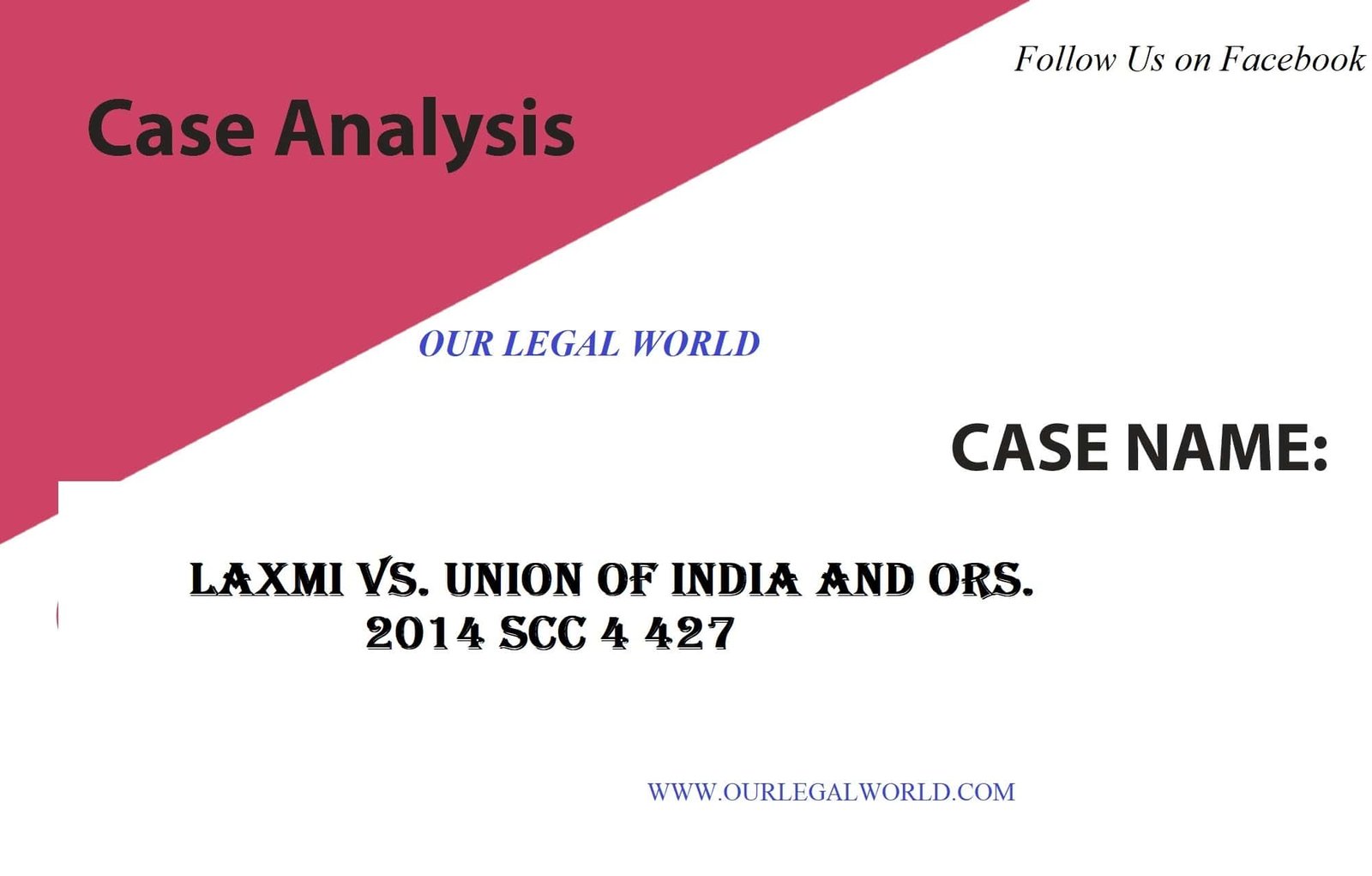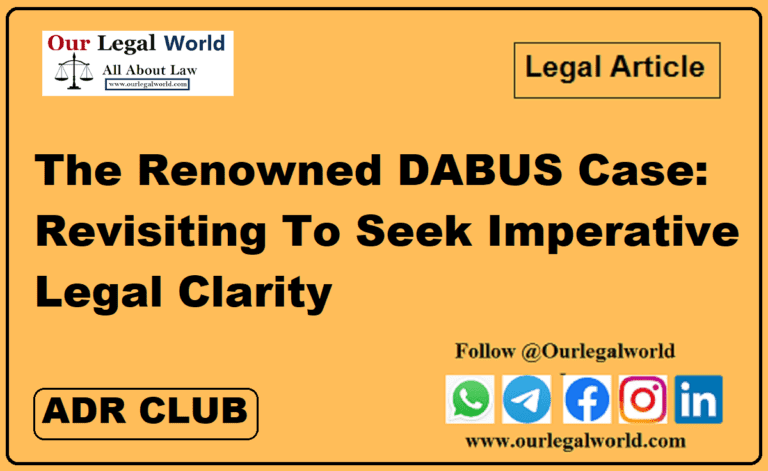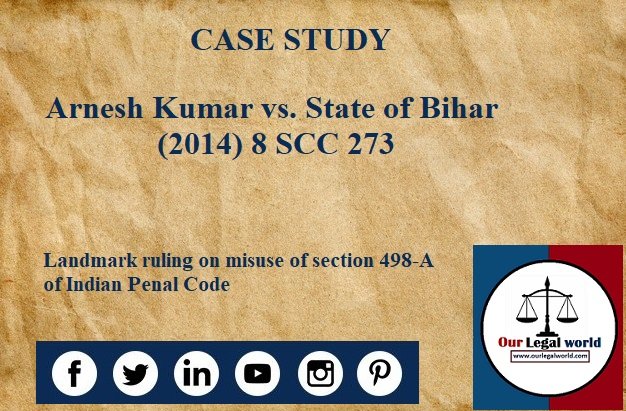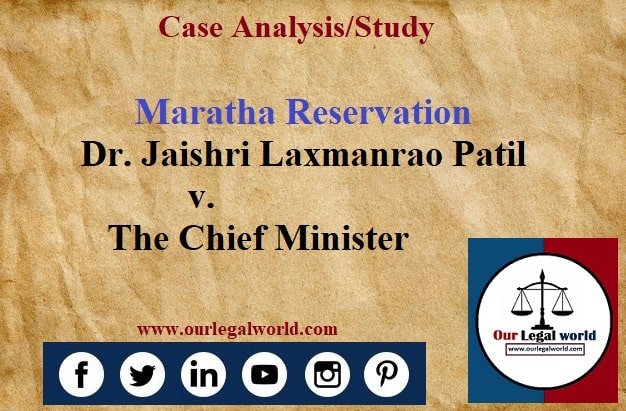Laxmi vs. Union of India and Ors. : Case Analysis
Case name: Laxmi vs. Union of India and Others Citation: 2014 SCC 4 427 Court Name: The Supreme Court of India Petitioner: Laxmi Respondent: Union of India and Others Date of Judgment: April 10, 2015
Introduction:
India has always been the hot spot for offences against women. Evidently, reporting the highest number of acid attack cases including other offences like sexual assault, rape, domestic violence, etc. According to a report of the National Crime Records Bureau (NCRB), an aggregate of 596 acid attack cases were reported in the years 2017 and 2018. The Statewide statistics reveal that Uttar Pradesh, West Bengal and Delhi have the most number of cases. One such acid attack, victim of Delhi named “Laxmi” took the matter to the Supreme Court. She had to fight various external and internal barriers. The Supreme Court took the matter seriously and issued several guidelines; however, the present scenario speaks that the guidelines have been implemented effectively.
Facts:
- This PIL was filed by Laxmi, who was 15 years old when met with an acid attack. Born in a middle class family, she supported her parents by working part time as a salesperson at a book depot. On the fateful day of April 22, 2005, two acquaintances stop by her and threw acid on her. People gathered when they heard her screams, but none offered any help. She was then taken to the Ram Manohar Lohiya Hospital, wherein the first aid treatment was administered to her. As per the medical report, the victim had received approximately 25% acid burns over the face, eyes, chest area and forearm. Later when she regained her consciousness, stated to the police that the culprits were Naeem Khan (Guddu) and Rakhi (his sister in law). She said that Naeem Khan, who had been a family friend, asked her for marriage which she clearly refused.
- The Sessions Court in Delhi, convicted the accused and co-accused under Section 307 (Attempt to Murder) read with section 120B (Punishment for criminal conspiracy) of the Indian Penal Code.
- The accused then filed an appeal in the Delhi High Court, questioning the decision given by the Sessions Court. The High Court upheld the decision given by the lower court. Additionally, directed the accused to pay a sum of rupees 3 lakhs as compensation to the victim under Section 357(1)(b) of Criminal Procedure Code.
- In 2013, Laxmi, filed a PIL in the Supreme Court to bring light to the whoes and sufferings of the acid attack victims. There have been multiple reasons for acid attack, however, refusal of marriage, rejection of sexual advances, dowry disagreements forms the common causes. The main purpose of filing this PIL was to have complete ban on the sale of acid, stricter laws regarding acid attacks and better compensation scheme.
Main prayers in the PIL:
- To put restrictions over the trading of acid in the open market.
- To amend the prevailing laws like the Indian Penal Code, Criminal Procedure Code, Indian Evidence Act in such a way as the Court deems fit and recognize “acid attack” as separate and grave offence.
- To constitute better rehabilitation and compensation schemes for the victims.
Judgement:
The Supreme Court took a quick step to regulate the trading of acid by issuing the subsequent guidelines:
- Guidelines for the seller and the Buyer:
- No acid could be sold to a person below the age of 18 years, further the buyer has to produce photo identity card and mention the purpose for such purchase. The seller has to forward this information to the nearest police station within 3 days.
- The seller has to submit the report of the stocks of acid to the Sub-divisional magistrate within fifteen days.
- The Sub-divisional magistrate has the power to confiscate the unreported stocks of acid and can impose the fine to the extent of 50,000 rupees.
- Guidelines for research, academic and other institutional purposes:
- The usage, purpose, quantity and other credentials has to be recorded in a register that shall be submitted to the Sub-divisional magistrate.
- There should be an authorized person for the safe handling of acid.
- The storage of acid will be under scrutiny of a person. Entry and exit of every person shall be recorded.
Taking the second pleading into consideration, the Court inserted the following sections in the Indian Penal Code, Criminal Procedure Code and India Evidence Act through the Criminal Amendment Act, 2013
- Indian Penal Code:
Section 320A and 320B lays down punishment for acid attacks and attempt to acid attack respectively.
Section 320A: Imprisonment for 10 years which may extend to life imprisonment and fine.
Section 326B:Imprisonment for five years which may extend to 7 years and shall also be liable to pay fine.
- Criminal Procedure Code:
The following sections were inserted under Cr.P.C.
Section 357A under sub-section (1) provides that the State Government in collaboration with the Central Government shall prepare compensation scheme for victim or his dependants.
In sub-section (2), on recommendation of the Court, the State or District Legal Services Authority shall decide the quantum of compensation to be given to the victim under the scheme.
Under sub-section (3), if the Court is of the opinion that the compensation given under section 357 of Cr.P.C is inadequate or when the offender is acquitted, then the court may make recommendations regarding the same.
Sub-section (4), victim or his dependants can move application to the State or District Legal Services Authority for awarding compensation, in case of non-identification of the offender.
Under sub-section (5), the State or District Legal Services Authority, on receipt of application under sub-section (4), conduct an enquiry within two months from the date of application and award appropriate compensation to the victim.
Sub-section (6) the State or District Legal Services Authority can also pass the order of free medical aid to the victim on account of the certificate issued by the officer incharge of the police station or the concerned magistrate.
Section 357B provides that the compensation payable by the State Government under section 357A shall be in addition to the payment of fine to the victim under section 326A or section 376D of the IPC.
- Indian Evidence Act:
In Section 114B, whoever throws or administers acid to another person, shall be said to have such intention and knowledge as is likely to have under section 326A of IPC.
Pertinent to the third pleading the Apex Court made the following provisions:
- A minimum compensation of 3 lakh rupees should be given to the victim.
- Hospitals cannot refuse treatment of the victim on account of lack of specialized facilities.
- The State Governments and the Central Government shall make efforts to bring private hospitals for following the guidelines issued under the matter.
- First Aid treatment should be given immediately to the victim.
- No hospital or clinic can deny treatment to the victim and if it does so, shall be made liable under section 357C of Cr.P.C.
- The victim shall be given be a medical certificate by a hospital where the initial treatment was provided and the same can be used by the victim for further treatment .
Also Read: Indian Council for Enviro-Legal Action v. Union of India: Polluter Pays
Conclusion:
Laxmi is an active member of “Chaanv” a non-governmental organization which provides employment to the acid attack survivors. She has been the awardee of “International Women of Courage Award” and “International Women Empowerment Award” in 2014 and 2019 respectively. In a recently released movie titled “Chappal” depicts the struggle story of Laxmi. Despite the guidelines issued by the Supreme Court many changes are yet to be made on the grassroot level.
References:
- https://indiankanoon.org
- Naeem Khan (Guddu) vs State on 7 October, 2013
- https://en.m.wikipedia.org – Acid Attack
- Law Times Journal – Laxmi vs. Union of India & ors.
- https://indiankanoon.org
- Laxmi vs Union Of India & Ors on 10 April, 2015
- www.legalserviceindia.com
- Scares of Acid Attack in Criminal Law Justice








![Tax Law Internship at Legum Attorney [Chamber of Ashish Panday], Delhi : Apply by 15th May 2025](https://www.ourlegalworld.com/wp-content/uploads/2025/05/IMG_0113-min.png)

